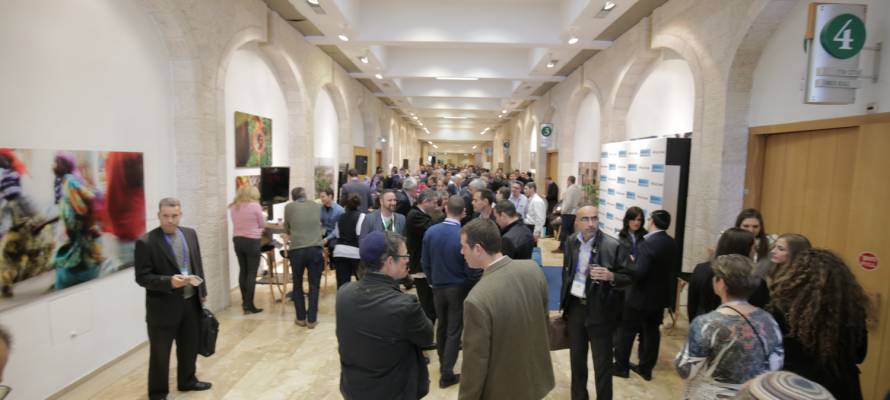The event, which brought together technology leaders and innovators from around the world to Jerusalem’s International Convention Center, featured some of Israel’s hottest start-ups.
You’re cruising along the highway. Suddenly, your car starts to sputter, your engine grumbles, and your car comes to a screeching halt. The tow truck drags the car to a local auto mechanic. Damage: $1,000.
You have no idea whether or not the mechanic is trying to do one over on you, but you will soon, thanks to a new Israeli innovation.
Engie puts the car owner in the driver’s seat by providing a special malfunction reader that simply plugs into your car to assess the problem. It then transports the data on the malfunction via Bluetooth technology to an app that offers more information on the damage and helps determine how much the repair should cost. If you want (and you’re in Israel), you can even get quotes from up to 100 mechanics in the Tel Aviv area.
According to Yaron Cohen, vice president of R&D for Engie, there have been more than 40,000 app downloads since the company launched its first round of pilot testing 10 months ago. He said that more than 700 million people get their cars repaired by mechanics each year, amassing costs of more than $150 million. Engie, a start-up that just completed its first round of funding, expects to be available in the U.S. within the next six months.
Cohen and his colleague, Ido Ozdoua, were among the 3,000 people either presenting or learning about Israeli technologies—and the prospect of investing in them—from Jan. 25-26 at the OurCrowd Global Investor Summit. The event, which brought together technology leaders and innovators from around the world to Jerusalem’s International Convention Center, featured some of Israel’s hottest start-ups. The agenda was packed with content, including talks by Jonathan Medved, founder and CEO of OurCrowd, the leading global equity crowdfunding platform for accredited investors; Alan Boehme, chief technology officer, chief innovation officer, chief architect, and customer/commercial CIO for the Coca-Cola Company; and Harel Kodesh, vice president and chief technology officer for GE-Digital. A first-ever “crowd hackathon” offered some insight into Israel’s ingenuity and creativity.
“It is amazing,” said United States Agency for International Development (USAID) Economic Growth Officer Jarir Dirini, who attended the event. “But we expect to find it here.”
Take BIRD, a small wearable device that turns any space into an interactive playground, which was recently developed by MUV Interactive. In a presentation, CEO Rami Parhan showed how the gadget can turn anything you touch to life.
“Remember the first time you touched a touch screen. It was magic. You couldn’t stop swiping. We have created a user interface that makes you feel that all over again,” Parhan said.
BIRD works with the devices and software you already use (iPads, projectors, and AV/VR headsets), or new ones. It allows you to push, pull, touch, grab, and move content from anywhere in the room, up to 100 feet away, with a swoosh of your fingertip.
Currently, BIRD is targeting the corporate and education sectors, and it has already placed 15,000 units in institutions of higher education. BIRD is being sold both through distribution channels and re-sellers in the U.S. and Asia.
Then there’s freeD—“free dimensional video”—from Replay Technologies, which is redefining what it means to watch and experience sports. Founded in 2012, the technology is already installed in stadiums around the world. It allows for immersive reality experiences for individuals using a smart screen, enables replays to be broadcast from different views and angles within 60 seconds, and can also be leveraged for commercial use. Already, freeD has seed-stage funding partnerships with with Samsung, Sony, Facebook, Google, and others.
Additional areas of Israeli technology showcased at the summit were green and agricultural, Web, and medical.
HIL Applied Medical’s CEO, Sagi Brink-Danan, spoke about the company’s new class of ultra-compact, high-performance accelerators for cancer proton therapy. The patented approach to particle acceleration and beam delivery enables reduction in the size, complexity, and cost of a proton therapy system.
Brink-Danan explained that proton therapy is nothing new—“we have known about it for 60 or 70 years and it has been practiced for more than 30 years,” he said. Nevertheless, today, more than 95 percent of cancer patients cannot benefit from the therapy because of the size of the proton therapy machinery and the cost to run it. The unique properties of laser-accelerated proton beams allow for further savings in the ancillary magnetic systems used for beam shaping and delivery, while providing state-of-the-art clinical capabilities.
The next big thing in upright mobility, UpNRide from UpNRide Robotics Ltd., is a new mobility solution for people bound to wheelchairs. The device enables them to sit and stand whenever they want to, and in all places—indoor and outdoor. The rider pushes a button to enable the standing position.
“They will be able to go up or down whenever any able-bodied person does it,” Dr. Oren Tamari said, noting the unprecedented safety of the device, which can maneuver on slopes and curves, and keeps the individual rider centered to avoid dizziness or falls.
The wheelchair has existed for centuries, and while its materials and technology have changed slightly over time, it is still simply a chair with four wheels. There are more than 8 million wheelchair users who suffer from poor health due to their sedentary lifestyle. Their quality of life and self-esteem suffers, and each person with a physical disability that relegates them to a wheelchair incurs annual costs of $70,000-$120,000 for the healthcare system. Enter UpNRide, which launched in 2014 and whose team of inventors includes the brains behind ReWalk Robotics, another Israeli venture—Tamari, Dr. Amit Goffer, and Dudi Haimovich.
“It’s all about inclusion,” said Tamari. “We are changing the world.”
By: Maayan Jaffe-Hoffman/JNS.org
